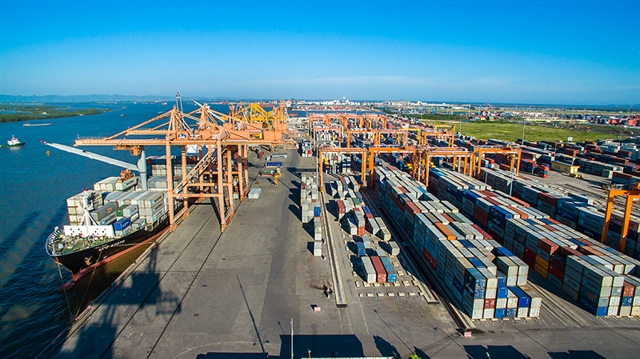 Economy
Economy


|
| Containers loaded up at Đình Vũ Port in nothern Hải Phòng City. — VNA Photo |
HÀ NỘI — Reduced revenue from cutting taxes on imported goods in accordance with various free trade agreements (FTA) Việt Nam had signed was unlikely to affect State revenue, said the finance ministry in a conference held on Thursday in Hà Nội.
Revenue from tariffs and taxes has decreased by VNĐ13 trillion (US$475 million) compared to the same period last year. However, the ministry said earlier forecasts for net revenue to reach VNĐ340 trillion by the end of the year remained unchanged.
Lê Mạnh Hùng, deputy head of Vietnam Customs’s tax department, said import/export taxes were not the only revenue source as goods were also subject to other regimes including special consumption taxes, value-added taxes, anti-dumping duties and environmental protections taxes, among others.
“FTAs only require the removal of import taxes. For goods subject to multiple tax regimes, only import taxes will be lifted,” said Hùng.
There had been a steady decrease in revenue from import taxes in recent years, according to a report by the customs authority, which resulted in smaller contribution to State revenue. Import tax revenue in 2018 dropped by VNĐ29 trillion and contributions to the State revenue ratio shrank by 4.4 per cent in comparison to the previous year.
Net revenue from customs agencies, however, has been steadily rising with last year’s total figure reaching VNĐ314 trillion and this year’s forecast at VNĐ340 trillion. The year’s total figure also depends on import/export activities.
In addition, increased revenue from the domestic market had helped offset the falling income from import taxes, said Hà Duy Tùng, deputy head of international trade cooperation at the finance ministry.
“Furthermore, Việt Nam has been taking a proactive approach to start negotiations with major economic partners to take full advantage of its export markets,” said Tùng.
Việt Nam has become a signatory of or in the process of joining 20 trade agreements with countries and economies around the world.
So far, 12 FTAs had gone into effect with the Regional Comprehensive Economic Partnership (RCEP), one of the world’s largest free trade agreements, likely to reach a conclusion in the near future, said Trần Thị Thu Huyền, a representative from the ministry.
Proposals to slash import taxes and tariffs for imported goods under these FTAs have been submitted to the Government to implement.
Notably, a road map to remove tariffs for imported goods from ASEAN countries was completed in 2018.
With regards to the Comprehensive and Progressive Agreement for Trans-Pacific Partnership (CPTPP) signed in 2018, Việt Nam is set to remove export tariffs for its goods in the next 5-15 years, with the exceptions of a number of important imports including crude oil, coal and gold.
The country had also set a target to reduce import tariffs to 0 per cent on 86.5 per cent of imported goods by 2022 with a plan to increase this figure to 97.8 per cent by 2029, according to the ministry. — VNS




